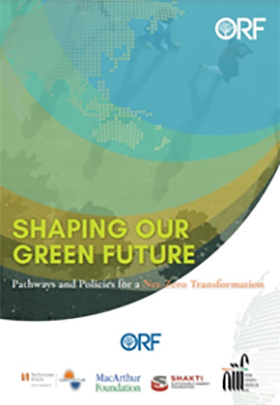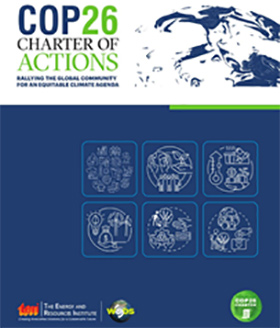India announced ambitious climate pledges at COP26 , the most significant being a net zero target by 2070. But this target is just the start. The real question is, how will we get there? What are some of the decarbonization pathways that India can adopt to turn this new climate ambition into a reality? And how can this transition be both just and inclusive? Here’s how we helped to lay the early groundwork to help answer these pressing questions.
Modelling Decarbonization Pathways for the Indian Economy
 Shakti and World Resources Institute (WRI) jointly contributed a brief on Modelling Decarbonization Pathways for the Indian Economy as part of the research compendium Shaping Our Green Future: Pathways and Policies for a Net-Zero Transformation published by the Observer Research Foundation (ORF).
Shakti and World Resources Institute (WRI) jointly contributed a brief on Modelling Decarbonization Pathways for the Indian Economy as part of the research compendium Shaping Our Green Future: Pathways and Policies for a Net-Zero Transformation published by the Observer Research Foundation (ORF).
This brief look at four scenarios of climate action for India using a systems dynamics model called the Energy Policy Simulator for India. It investigates policy trade-offs and co-benefits and estimates the costs of climate action. The findings of this analysis show that deep decarbonization in the Indian economy is possible while also boosting jobs and GDP and avoiding millions of premature deaths due to harmful air pollution. The brief underscores the need for massive investments in power, industry, transport, and hydrogen, as well as early policy signals that could accelerate technology adoption by industry, benefiting from decreasing technology costs.
The compendium itself features together a fantastic set of perspectives from The Fletcher Business School, Climate Policy Lab, MacArthur Foundation, National Investment and Infrastructure Fund, iFOREST and others. Released by ORF at a COP side event on 8th November 2021, this was a timely publication, coming in just after India announced its net zero target.
COP26 Charter of Actions
 Shakti contributed to the development of the COP26 Charter of Actions published by The Energy and Resources Institute (TERI). The charter is a knowledge document that that assimilates questions and thematic options that can advance climate action and ambition in the country and globally.
Shakti contributed to the development of the COP26 Charter of Actions published by The Energy and Resources Institute (TERI). The charter is a knowledge document that that assimilates questions and thematic options that can advance climate action and ambition in the country and globally.
The Charter examines the themes of equity, green finance, adaptation and resilience, nature-based solutions, energy, clean transport, and business actions in the context of India. While exploring these themes, the Charter highlights the need for cross-sectoral climate action and emphasizes moving beyond rigid silos of unidimensional action to tackle climate change. In the process, it also offers a way forward for the global community for and beyond COP26.
The Charter was released by TERI at a COP26 side event on November 6, 2021 by Shri Rameshwar Prasad Gupta, Secretary, Ministry of Environment, Forest and Climate Change.
The Charter activities are supported by the British High Commission, Bloomberg Philanthropies, Shakti and Tata Cleantech Capital.